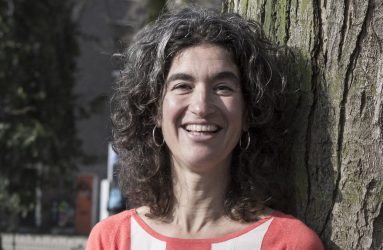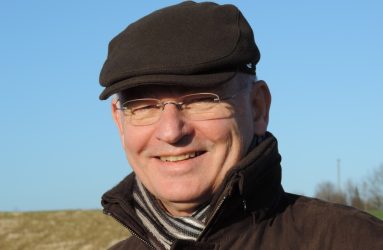Connecting people
Both ENDS is proud to engage with a wide and diverse group of partners and allies – from NGOs to community-based organisations, from small grants funds to social movements, from water experts to women’s rights activists. Each and every day, we learn from our partners and channel that learning back into the work we do and the way we do it.
This year was an important moment for reflection as we initiated the development of a new five-year strategy to take us beyond 2020. To start the process, we turned to our partners. We asked for honest feedback about our record until now. We asked what they expect and need from us. We asked what themes we should be working on, with whom and how.
What we heard was quite consistent. Partners told us they value the link Both ENDS makes between the local and the global, particularly our expertise in connecting key elements of the global economic system to local impacts. Partners affirmed the critical role Both ENDS plays for them in generating both access to funding and access to key policy spaces.
Partners also said they appreciated our role as an ‘activist negotiator’ that engages in formal dialogues with key decision-makers, while maintaining close connections to organisations and movements that exert pressure ‘outside’ the negotiation room. Finally, we heard that we are seen as an equal and ‘ego-less’ partner, a wonderful compliment not only to Both ENDS as an organisation but also to our dedicated staff. In sum, we heard that ‘Connecting people for change’ remains an apt description of Both ENDS’s added value in our collective effort with partners to create a more sustainable, fair and inclusive world.
In recent years, Both ENDS has intensified its connections with people’s movements, particularly climate justice and women’s rights movements. We have learned to be sensitive to power dynamics in these relationships. It is our role to understand the rhythm of people’s movements and learn how to follow their lead. The first step entails showing that we are ‘with them’. The second step is asking if and how we can contribute.
As you’ll read in the cases that follow, our contribution may be in the form of technical expertise, like the workshop we gave on International Finance Institutions at the request of women environmental activists in El Salvador. Or it may be bringing diverse groups together, as we did in Indonesia in a new project that weaves together women’s rights, water quality, and corporate accountability in the palm oil sector. Or it may be in building new relationships with donors to ensure that partners have the funding they need to build their movements, like the movement of local communities that are working together, and making great strides, in regreening the Sahel.
In all of these efforts, our task has been to listen, to see where the energy is, and offer our resources and knowledge in ways that are needed and appreciated. Our work on financial flows is a good example. People’s movements sometimes don’t think of economic actors as central to their agendas. But they know that in order for transformative practices to take hold and grow, we must shift financial flows in their direction. We’re pleased to have made some important progress on that front.
Thanks to our collaboration with women’s funds in the Global Alliance for Green and Gender Action (GAGGA), we’ve acquired a new language to describe our longstanding strategy of supporting small grants funds, which are critical for channelling resources to grassroots groups and communities. We’ve gained new insights into fundraising and the funding world that have enhanced our success in securing financial support for partners. We have also developed partnerships with funders that go well beyond the typical donor-recipient relationship. In collaboration with DOB Ecology, for example, we published research and organised a conference for key donors, including the Ministry of Foreign Affairs, to highlight the importance of small grants funds for advancing environmental justice. Together with the Dutch Postcode Lottery, we inspired a farsighted group of private investors in the Netherlands to sign the DivestInvest pledge. We are pleased to have been selected by the Dutch Postcode Lottery as a new five-year beneficiary. We plan to use the funding to develop our expertise on the investment side of the DivestInvest equation. We want to gather the tools needed to connect economic enablers with those who are doing the hard work of social and economic transformation.
For many movements and communities, that work is not only difficult, but dangerous. In Brazil, Nicaragua, Burkina Faso, the Philippines and many other countries, space for civil society is shrinking. The lives of environmental defenders are at risk, as is everything they and we are trying to achieve. Increased violence against indigenous peoples and the burning of the Amazon rainforest in Brazil – more than 200 million hectares were lost in 2019 – show how the human rights and climate change agendas are one and the same. As a major trading partner of Brazil, and one of the world’s largest economies, the Netherlands can have a huge impact on this problem if we take bold action, like putting an end to public financing of dirty and dangerous energy projects abroad. In public events like the ‘Forgotten Climate Roundtable’ and in dialogues with a variety of Dutch policymakers, we have conveyed this urgent message, and will continue to do so. We also joined Friends of the Earth NL in the lawsuit against Shell, challenging the company to bring their activities in line with the Paris agreement.
TOWARD 2025
All the experiences and lessons we’ve learned – about movements, civic space, financial flows, investment – has fed into the development of a new five-year strategy and new programmes. In the coming year, we will look at what Both ENDS needs to successfully implement our objectives. We will develop a new communications strategy, which, given the diversity of our audiences, is something we have struggled with. Next year will also be an important year for fundraising, as we apply to renew our strategic partnerships with the Ministry of Foreign Affairs, the Fair, Green and Global Alliance and the Global Alliance for Green and Gender Action. We are confident that we have the right formula to succeed. As our partners confirmed, and as the stories included here confirm, connecting people truly does lead to change.
Danielle Hirsch, Director
Paul Engel, Chair of the Board


